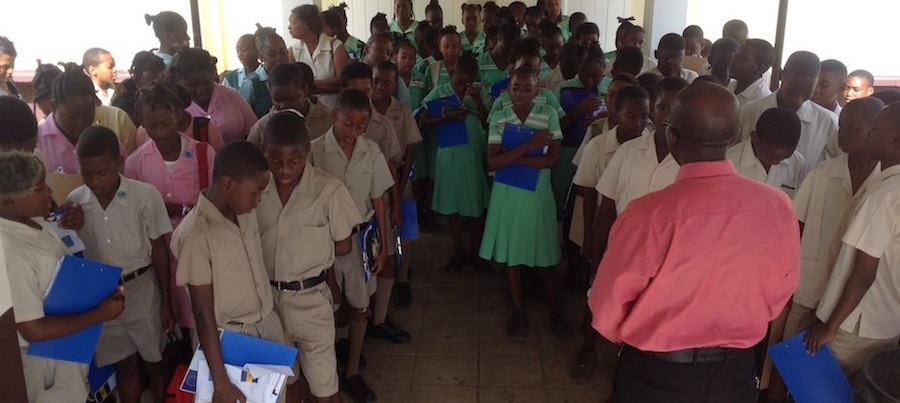 My friend, former teaching colleague and fellow social commentator, John Goddard, recently submitted a piece outlining his support of the Prime Minister’s apparent intention to ‘abolish’ the Common Entrance exam. As he admits, Mr Goddard has been somewhat critical of Ms Mottley and the BLP administration on several fronts. He is, however, in full accord with her stated proposal to alter, apparently in some fundamental way, the transfer of students from primary to secondary levels of schooling. Addressing the recent BLP meeting in the Carlisle Car Park, the Prime Minister noted, that as former Minister of Education, she had introduced partial zoning and was now prepared to ‘go the whole hog.’
My friend, former teaching colleague and fellow social commentator, John Goddard, recently submitted a piece outlining his support of the Prime Minister’s apparent intention to ‘abolish’ the Common Entrance exam. As he admits, Mr Goddard has been somewhat critical of Ms Mottley and the BLP administration on several fronts. He is, however, in full accord with her stated proposal to alter, apparently in some fundamental way, the transfer of students from primary to secondary levels of schooling. Addressing the recent BLP meeting in the Carlisle Car Park, the Prime Minister noted, that as former Minister of Education, she had introduced partial zoning and was now prepared to ‘go the whole hog.’
The BLP administration has not spelled out what the ‘whole hog’ would look like. Does this imply total zoning? Is Harrison College to become an inner city comprehensive school? The BLP Government should take its time and not act so hastily. ‘Hot and sweaty’, I think, was the term used by its opponents.
An educational structure is not one of those temples that you can destroy and rebuild in three days. That is why educational systems, generally speaking, tend to be rather conservative. There are paradoxes in education. One such, is the fact that while it is based on the present and to some extent the past, it looks to a future which no one can truly know. Then, there is always the law of unintended consequences in a process that is often more complex than people imagine. Secondly, one is dealing with people’s children and their futures. Education is not a sphere of activity in which one can do a quick reversal if things go fundamentally wrong.
Fundamental changes should not be made without appropriate consultation with parental associations, teachers’ unions and other stakeholders who must ‘buy-in’ to the reforms if they are to be successful.
John Goddard, like the late Matthew Farley, is a very conscientious educator. Having been a classroom teacher most of his life and having taught at both older and newer secondary schools, he understands the wide range of abilities and how socio-economic backgrounds can promote or retard educational progress.
John Goddard’s recent submission is arguably one of the most plausible attempts to offer a serious alternative construct to what currently obtains. I do believe that like most theoretical propositions, it may overlook certain realities relating to aspects of Barbadian society. Over the years, I have come to agree that there may be something socially unjust about the allocation system which places certain children of lower academic abilities and invariably, from the lower socio-economic strata, in certain schools and higher abilities often from the upper strata in other institutions.
Mixing the abilities in single schools based on geographical proximity does not, in itself, ensure social justice or educational enhancement. That could be mere window-dressing unless a lot of structural, remedial-interventionist initiatives are undertaken.
I support a number of John Goddard’s proposals. First, I support the notion of continuous assessment with tests at ages nine and eleven. These would have to be universal, with all children doing the same exam at their own schools. The purpose would be essentially diagnostic – simply to ascertain what percentage of children are above, on par with, or below the accepted cognitive level for that particular age and to recommend the obligatory remedial-interventionist initiatives before and after age eleven.
Mr Goddard gets around the issue of transfer by taking five schools out of the mix and mandating that all other secondary institutions draw their intake from the primary school in their geographical zone, irrespective of ability. Presumably, this means that the assessment at eleven will merely determine what stream each child enters. Some element of streaming or tracking, to use the American term, will be necessary. It makes no sense to place a child who gets 30 per cent and below in the same class with students who obtain 90 per cent and above and are recognisably operating at a much higher level of cognition.
Education is about equality of opportunity, not about equality of outcome or results, at least not in the real world. Goddard makes it clear that parents who opt out of this system of transfer do so at their own risk and expense. The removal of parental choice within the public system may not go down well with many segments of Barbadian society. It was Tom Adams who stated that ‘education elitism exists in the hearts of Barbadians of all walks of life.’ Given the currency of the abolition movement, I was surprised how many callers to CBC TV on the night of Sunday, June 9, opposed the abolition of the Common Entrance Examination. Abolition, if it is not properly managed, could have serious political consequences if the academic and behavioural standards at all schools fail to reflect a sufficiently high level of parity.
Goddard’s idea of a technical/vocational institution for those students who, after age 13 show a disinclination or inability to pursue the more academic disciplines, is a good one. Most children have some ability. Our problem as a country is that we believe, quite disastrously, that worthy competencies are primarily academic and white-collar professional, even when the competencies and professionalism prove to be at best, modest.
John Goddard’s most radical notion is for five schools to become sixth form colleges and he names them and their function as so-called ‘schools of excellence.’ Harrison College is to be the centre for Science and Technology; Queen’s College for the Humanities; Lodge School for the Creative Arts and Theatre; The Foundation School for Sports and Culture; the Alexandra School for Agriculture, Food and Nutrition.
Firstly, contrary to what people assume, schools do not become centres of excellence simply because we call them such, although they may emerge as such overtime. Secondly, an elitist hierarchy is likely to emerge within the caucus of colleges, given what careers parents and students perceive as most financially rewarding.
The brightest would opt for Harrison College for Science and Technology studies to obtain the rewarding jobs relevant to those disciplines. I am not sure how many in this day and age would opt for the Humanities. Culture and the Performing Arts would draw its share of moderate to gifted students and Agriculture, Food and Nutrition is likely to occupy the lower rung of the hierarchy. I am not sure that I would ask my child to opt for Agriculture given the rate at which land is going out of cultivation, the level of praedial larceny and the apparent inability of the country to make up its mind about food sustainability.
Pedagogically speaking, I am not sure that it is wise, at any level of schooling, to make such sharp specialisation between Science and Technology, the Humanities, Culture and the Arts and Agriculture and Food Nutrition. Why shouldn’t a technology student read Shakespeare or Lamming or Naipaul? I believe that there should be a liberal component to all levels and types of schooling.
Out of sheer curiosity, I would like to see how the reforms suggested by Goddard would actually turn out. My fear is that in Minister Santia Bradshaw’s attempt to ‘shake up’ the education system, we might miss and break something really valuable. I am even more wary that in Prime Minister Mottley’s willing to ‘skin a cuffin’ to abolish the 11-plus, she might somehow hurt herself. I am worried because I have been accused by no less a person than John Goddard himself, of ‘buying into the Mottley myth’, whatever that is.
Ralph Jemmott is a respected
retired educator.




